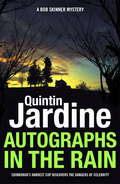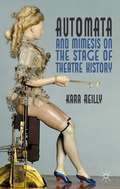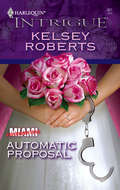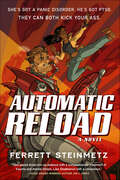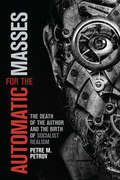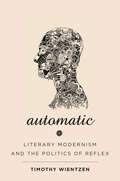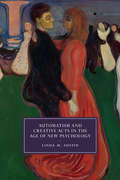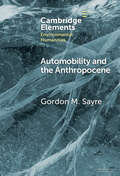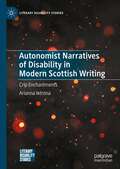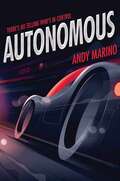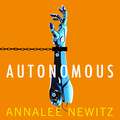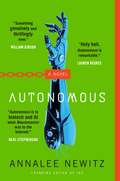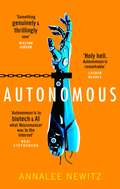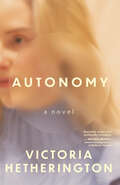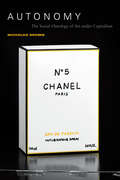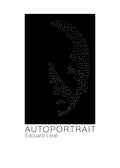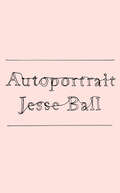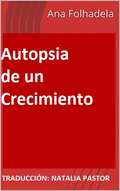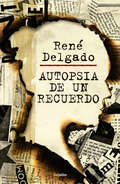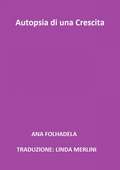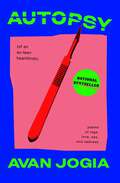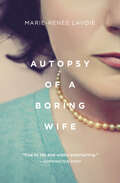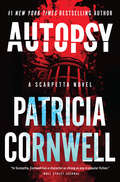- Table View
- List View
Autographs In The Rain: A suspenseful crime thriller of celebrity and murder (A\bob Skinner Mystery Ser.)
by Quintin JardineAs Bob Skinner takes an evening stroll with a gorgeous filmstar on his arm, surely the worst of his worries is that back at Headquarters, an ambitious new colleague is scheming to enlarge his territory at Skinner?s expense. But when a frightening shot-gun attack sends Skinner and his old flame Louise Bankier diving for cover, it seems danger has zeroed in on him once again. Returning to Scotland to shoot her latest film, Louise is one of Scotland's most popular exports. But it seems she has a stalker; someone who is clearly determined to scare her. For Skinner, tracking down her tormentor isn't just business - it's now very personal indeed. The Detective Chief Constable, however, is about to find out that nothing is quite what it seems...
Autographs in the Rain: A suspenseful crime thriller of celebrity and murder (Bob Skinner #11)
by Quintin JardineEdinburgh's toughest cop discovers the dangers of celebrity... DCC Bob Skinner is about to find out that nothing is quite what it seems in Autographs in the Rain, the eleventh title in the bestselling crime series by Quintin Jardine. Perfect for fans of Ian Rankin and Peter James.'Jardine's delightful hero finds himself investigating a case very close to home, and this latest from the man the Glasgow Herald calls the Sean Connery of Scottish crime fiction delivers another cracker' - Murder One As Bob Skinner takes an evening stroll with a gorgeous filmstar on his arm, surely the worst of his worries is that back at Headquarters, an ambitious new colleague is scheming to enlarge his territory at Skinner's expense. But when a frightening shot-gun attack sends Skinner and his old flame Louise Bankier diving for cover, it seems danger has zeroed in on him once again. Returning to Scotland to shoot her latest film, Louise is one of Scotland's most popular exports. But it seems she has a stalker; someone who is clearly determined to scare her. For Skinner, tracking down her tormentor isn't just business - it's now very personal indeed. The Detective Chief Constable, however, is about to find out that nothing is quite what it seems... What readers are saying about Autographs in the Rain: 'Skinner at his most fearsome''Utterly brilliant and thoroughly entertaining''The separate strands of the story mesh together to make it one of the best of the series''Thrilling, tightly written, with believable characters and a main character (Bob Skinner) who is so human I almost feel that I know him'
Automata and Mimesis on the Stage of Theatre History
by Kara ReillyThe automaton, known today as the robot, can be seen as a metaphor for the historical period in which it is explored. Chapters include examinations of Iconoclasm's fear that art might surpass nature, the Cartesian mind/body divide, automata as objects of courtly desire, the uncanny Olympia, and the revolutionary Robots in post-WWI drama.
Automatic Proposal
by Kelsey RobertsARMED AND GORGEOUSKeeping her work with Miami Confi dential secret had never been a problem for skilled agent Julia Garcia. Then Luke Young, the man she left standing at the altar after a sting operation, reappeared in her life, demanding answers. With the kidnapping of her best friend, Julia had to maintain her cover at the Weddings Your Way salon or jeopardize the case. Yet their intense chemistry, combined with Luke's probing questions, had Julia torn between commitment to her job and to her heart. But once Luke became an unknown enemy's target, Julia vowed she'd do whatever it took to keep her former fiancé safe...or die trying.
Automatic Reload: A Novel
by Ferrett SteinmetzA tortured mercenary and a genetically engineered assassin fall in love while running for their lives in this high-octane cyberpunk romance adventure.“Steinmetz expertly fuses cyberpunk staples and romantic comedy elements to deliver an over-the-top, action-packed tale while also addressing mental illness and body issues.” —Publishers Weekly (starred review)Meet Mat, a tortured mercenary who has become the perfect shot, and Silvia, an idealistic woman genetically engineered to murder you to death.Together they run from the shadiest corporation in the world . . . and realize their messed-up brain chemistry cannot overpower their very real chemistry . . .Automatic Reload is the genre’s most unexpectedly heartfelt romantic comedy with explosions, perfect for fans of both Altered Carbon and Atomic Blonde.“Fast-paced shoot-em-up violence with a compassionate treatment of trauma and mental illness. Like Shadowrun with a conscience.” —Hugo Award–winning author Jim C. Hines“Luxuriates in the intricate beauty that is technology, exults in the mechanics of cyberpunk. And it does all this while being a rom-com with a lot of explosions.” —Cassandra Khaw, finalist for the British Fantasy and Locus Awards for Hammers on Bone
Automatic for the Masses
by Petre M. PetrovAt the end of the 1920s, the Modernist and avant-garde artistic programmes of the early Soviet Union were swept away by the rise of Stalinism and the dictates of Socialist Realism. Did this aesthetic transition also constitute a conceptual break, or were there unseen continuities between these two movements? In Automatic for the Masses, Petre M. Petrov offers a novel, theoretically informed account of that transition, tracing those connections through Modernist notions of agency and authorship.Reading the statements and manifestos of the Formalists, Constructivists, and other Soviet avant-garde artists, Petrov argues that Socialist Realism perpetuated in a new form the Modernist "death of the author." In interpreting this symbolic demise, he shows how the official culture of the 1930s can be seen as a perverted realization of modernism's unrealizable project. An insightful and challenging interpretation of the era, Automatic for the Masses will be required reading for those interested in understanding early Soviet culture.
Automatic: Literary Modernism and the Politics of Reflex (Hopkins Studies in Modernism)
by Timothy WientzenA fascinating study of how behavioral science shaped twentieth-century politics and the modernist literary period.The advent of the twentieth century famously brought about new personal and political freedoms, including radical changes in voting rights and expressions of gender and sexuality. Yet writers and cultural critics shared a sense that modern life reduced citizens to automatons capable of interacting with the world in only the most reflexive ways. In Automatic, Timothy Wientzen asks why modernists were deeply anxious about the role of reflexive behaviors—and the susceptibility of bodies to physical stimuli—in the new political structures of the twentieth century. Engaging with historical thinking about human behaviors that fundamentally changed the nature of political and literary practice, Wientzen demonstrates the ways in which a "politics of reflex" came to shape the intellectual and cultural life of the modernist era. Documenting some of the ways that modernist writers and their contemporaries mapped, harnessed, and intervened in a political sphere dominated by conditioned reflexes, Wientzen reads writers like D. H. Lawrence, Rebecca West, Wyndham Lewis, and Samuel Beckett in conversation with fields that include public relations, physiology, sociology, and vitalism. Ultimately, he justifies a reckoning with some of the most enduring preoccupations of modernist studies.Automatic further emphasizes the role of politics and science in the aesthetic projects of modernist writers. At a moment when political enfranchisement and the mass media promised new modes of freedom, agency, and choice, Wientzen argues that the modernist era was beset by apprehension about the conscription of liberty through the conditioning force of everyday life. Analyzing such thinking through a neglected archive about embodiment and reflex reveals modernists responding to the historically novel conditions of political life in the twentieth century—conditions that have become entrenched in the politics of our own century.
Automatism and Creative Acts in the Age of New Psychology (Cambridge Studies In Nineteenth-century Literature And Culture Ser. #111)
by Linda M. AustinThe late nineteenth century saw a re-examination of artistic creativity in response to questions surrounding the relation between human beings and automata. These questions arose from findings in the 'new psychology', physiological research that diminished the primacy of mind and viewed human action as neurological and systemic. Concentrating on British and continental culture from 1870 to 1911, this unique study explores ways in which the idea of automatism helped shape ballet, art photography, literature, and professional writing. Drawing on documents including novels and travel essays, Linda M. Austin finds a link between efforts to establish standards of artistic practice and challenges to the idea of human exceptionalism. Austin presents each artistic discipline as an example of the same process: creation that should be intended, but involving actions that evade mental control. This study considers how late nineteenth-century literature and arts tackled the scientific question, 'Are we automata?'
Automobility and the Anthropocene: The Car as Post-Human (Elements in Environmental Humanities)
by Gordon M. SayreThe automobile has transformed Earth's habitats and humans' habits since the 1890s, when it, this Element argues, began the Anthropocene. Climate change now motivates efforts to reduce greenhouse gas emissions, of which cars and trucks account for at least 10 percent. Shifting to electric vehicles is not enough; one needs to better understand the power cars hold over humans. Environmental humanities scholars examine human/machine hybrids but have ignored the most obvious example. Humans driving cars are social agents constituting a civil society of automobility in roadscape environments. This Element traces the evolution of cars from horsecars, carriages, and bicycles, and the influence of Henry Ford and Alfred P. Sloan on labor standards and consumer behaviors. As the car industry pushes high-tech autonomous or self-driving vehicles, it relies on futuristic fantasies and false promises. The ills of automobility cannot be solved with new products that only intensify human dependence upon cars.
Autonomist Narratives of Disability in Modern Scottish Writing: Crip Enchantments (Literary Disability Studies)
by Arianna IntronaAutonomist Narratives of Disability in Modern Scottish Writing: Crip Enchantments explores the intersection between imaginaries of disability and representations of work, welfare and the nation in twentieth and twenty-first century Scottish literature. Disorienting effects erupt when non-normative bodies and minds clash with the structures of capitalist normalcy. This book brings into conversation Scottish studies, disability studies and Marxist autonomist theory to trace the ways in which these “crip enchantments” are imagined in modern Scottish writing, and the “autonomist” narratives of disability by which they are evoked.
Autonomous
by Andy MarinoWilliam Mackler is about to go on the road trip of a lifetime. After winning a contest―and nearly dying in the process―he becomes the proud owner of Autonomous, a driverless car that knows where you want to go before you do. #Worthit! To sweeten the deal he gets to pick three friends to go with him on a cross-country trip―his best friend, Daniel; Daniel’s girlfriend, Melissa; and the girl next door Christina. <p><p> For William, a reckless adrenaline junkie, this is the perfect last hurrah for him and his crew before they go their separate ways after graduation. But Autonomous is more than just a car without a steering wheel. It's capable of downloading all of the passengers’ digital history―from the good, to the bad, to the humiliating. The information is customized into an itinerary that will expose a few well-kept secrets, but it will also force William to face some inner demons of his own. <p><p> This funny, tense, action-packed thriller combines topical social-media-privacy stakes with jaw-dropping high-tech action for a road trip saga like no other.
Autonomous
by Annalee Newitz'Autonomous is to biotech and AI what Neuromancer was to the internet' NEAL STEPHENSON 'Something genuinely and thrillingly new' WILLIAM GIBSON 'Holy hell. Autonomous is remarkable' LAUREN BEUKESWINNER OF THE 2018 LAMBDA AWARD FOR SFFSHORTLISTED FOR THE NEBULA AWARD 2018SHORTLISTED FOR THE LOCUS AWARD FOR BEST DEBUT 2018Earth, 2144. Jack is an anti-patent scientist turned drug pirate, traversing the world in a submarine as a pharmaceutical Robin Hood, fabricating cheap medicines for those who can't otherwise afford them. But her latest drug hack has left a trail of lethal overdoses as people become addicted to their work, doing repetitive tasks until they become unsafe or insane. Hot on her trail is an unlikely pair: Eliasz, a brooding military agent, and his indentured robotic partner, Paladin. As they race to stop information about the sinister origins of Jack's drug from getting out, they begin to form an uncommonly close bond that neither of them fully understands. And underlying it all is one fundamental question: is freedom possible in a culture where everything, even people, can be owned?
Autonomous: A Novel
by Annalee Newitz<P>When anything can be owned, how can we be free? <P>Earth, 2144. Jack is an anti-patent scientist turned drug pirate, traversing the world in a submarine as a pharmaceutical Robin Hood, fabricating cheap scrips for poor people who can’t otherwise afford them. But her latest drug hack has left a trail of lethal overdoses as people become addicted to their work, doing repetitive tasks until they become unsafe or insane. <P>Hot on her trail, an unlikely pair: Eliasz, a brooding military agent, and his robotic partner, Paladin. As they race to stop information about the sinister origins of Jack’s drug from getting out, they begin to form an uncommonly close bond that neither of them fully understand. <P>And underlying it all is one fundamental question: Is freedom possible in a culture where everything, even people, can be owned? <P><b>Nominated for 2017 Nebula Awards- Best Novel</b>
Autonomous: A Novel
by Annalee Newitz'Autonomous is to biotech and AI what Neuromancer was to the internet' NEAL STEPHENSON 'Something genuinely and thrillingly new' WILLIAM GIBSON 'Holy hell. Autonomous is remarkable' LAUREN BEUKESWINNER OF THE 2018 LAMBDA AWARD FOR SFFSHORTLISTED FOR THE NEBULA AWARD 2018SHORTLISTED FOR THE LOCUS AWARD FOR BEST DEBUT 2018Earth, 2144. Jack is an anti-patent scientist turned drug pirate, traversing the world in a submarine as a pharmaceutical Robin Hood, fabricating cheap medicines for those who can't otherwise afford them. But her latest drug hack has left a trail of lethal overdoses as people become addicted to their work, doing repetitive tasks until they become unsafe or insane. Hot on her trail is an unlikely pair: Eliasz, a brooding military agent, and his indentured robotic partner, Paladin. As they race to stop information about the sinister origins of Jack's drug from getting out, they begin to form an uncommonly close bond that neither of them fully understands. And underlying it all is one fundamental question: is freedom possible in a culture where everything, even people, can be owned?
Autonomy
by Victoria HetheringtonIn a near future ravaged by illness, one woman and her AI companion enter a dangerous bubble of the superrich.It's 2035: a fledging synthetic consciousness “wakes up” in a lab. Jenny, the lead developer, determined to nurture this synthetic being like a child, trains it to work with people at the border of the American Protectorate of Canada. She names it Julian.Two years later, Slaton, a therapist at a university, is framed by a student for arranging an illegal abortion. She follows the student to America and is detained at the border, where she meets Julian in virtual space. After a week of interviewing, he decides to stay with her, learning about the world, the human condition, and what it means to fall in love. Meanwhile, a mysterious plague is spreading across the world. Only the far-seeing and well-connected Julian can protect Slaton from the impending societal collapse.Autonomy is an ambitious philosophical novel about the possibilities for love in a world in which human bodies are either threatened or irrelevant.A RARE MACHINES BOOK
Autonomy: The Social Ontology of Art under Capitalism
by Nicholas BrownIn Autonomy Nicholas Brown theorizes the historical and theoretical argument for art's autonomy from its acknowledged character as a commodity. Refusing the position that the distinction between art and the commodity has collapsed, Brown demonstrates how art can, in confronting its material determinations, suspend the logic of capital by demanding interpretive attention. He applies his readings of Marx, Hegel, Adorno, and Jameson to a range of literature, photography, music, television, and sculpture, from Cindy Sherman's photography and the novels of Ben Lerner and Jennifer Egan to The Wire and the music of the White Stripes. He demonstrates that through their attention and commitment to form, such artists turn aside the determination posed by the demand of the market, thereby defeating the foreclosure of meaning entailed in commodification. In so doing, he offers a new theory of art that prompts a rethinking of the relationship between art, critical theory, and capitalism.
Autoportrait
by Lorin Stein Edouard LevéIn this brilliant and sobering self-portrait, Edouard Levé hides nothing from his readers, setting out his entire life, more or less at random, in a string of declarative sentences. Autoportrait is a physical, psychological, sexual, political, and philosophical triumph. Beyond "sincerity," Levé works toward an objectivity so radical it could pass for crudeness, triviality, even banality: the author has stripped himself bare. With the force of a set of maxims or morals, Levé's prose seems at first to be an autobiography without sentiment, as though written by a machine-until, through the accumulation of detail, and the author's dry, quizzical tone, we find ourselves disarmed, enthralled, and enraptured by nothing less than the perfect fiction . . . made entirely of facts.
Autoportrait
by Lorin Stein Edouard LevéIn this brilliant and sobering self-portrait, Edouard Levé hides nothing from his readers, setting out his entire life, more or less at random, in a string of declarative sentences. Autoportrait is a physical, psychological, sexual, political, and philosophical triumph. Beyond "sincerity," Levé works toward an objectivity so radical it could pass for crudeness, triviality, even banality: the author has stripped himself bare. With the force of a set of maxims or morals, Levé's prose seems at first to be an autobiography without sentiment, as though written by a machine-until, through the accumulation of detail, and the author's dry, quizzical tone, we find ourselves disarmed, enthralled, and enraptured by nothing less than the perfect fiction . . . made entirely of facts.
Autoportrait
by Jesse BallA work of unflinching honesty, Autoportrait is a hypnotic memoir of reflection, loss, and everyday joy from one of America's best contemporary novelistsJesse Ball has produced fourteen acclaimed works of deeply empathetic absurdism in poetry and fiction. Now, he offers readers his first memoir, one that showcases his &“humane curiosity&” (James Wood) and invites the reader into a raw and personal account of love, grief, and memory. Inspired by the memoir Édouard Levé put to paper shortly before his death, Autoportrait is an extraordinarily frank and intimate work from one of America's most brilliant young authors.The subtle power of Ball's voice conjures the richness of everyday life. On each page, half-remembered moments are woven together with the joys and triumphs—and the mistakes and humiliations, too—that somehow tell us who we are, why we are here. Held at the same height as tragic accounts of illness or death are moments of startling beauty, banality, or humor: "I wake in the morning, I sit, I walk long distances. If there is somewhere to swim, I may swim. If I have a bicycle, I will ride it, especially to meet someone. There is no more preparing for me to do, other than preparing for death, and I do that by laughing. Not laughing at death, of course. Laughing at myself." An extraordinary memoir that reminds us what is possible and builds to the kind of power one might feel reading Anne Carson's Glass Essay, or Joe Brainard's I Remember. Autoportrait will leave you feeling utterly invigorated, inspired, and a little afraid.
Autopsia de un Crecimiento
by Ana FolhadelaLibro de reflexiones, dedicado a la memoria de mis padres. Luchando con el otro infierno que está dentro de cada uno de nosotros. El bicho hombre es un ser doble en el cual uno de los dos lados se divierte atormentando y el otro pasa todo el tiempo defendiéndose, mientras el tiempo discretamente pasa y los evita a ambos. Pero es más complicado dejar de oirse cuando nos comprendemos. Es complicado intentar convencer a una persona de que está errada cuando quien la convence siente que la otra tiene razón. Es complicado creer que eso cambiará el mundo cuando se cree que el mundo apenas nos quiere engañar para normalizarnos. Porque si ese mundo fuera para adelante y el otro, que está adelante, fuera para atrás, perdemos por eso la fuerza de empuje de lo que está más adelante para avanzar más, porque ese es nuestro deber como persona, independientemente de ser lo mejor o lo más provechoso para nosotros, estaremos haciéndole mal al mundo. Estaremos cayendo en la apatía. Dejaremos de ser nosotros. Si siempre nos conocemos así ¿cómo vamos a coseguir vivir como una persona que no somos, pero que conoce todo el bien y el mal en nosotros? Desilusionarnos y dejar de vivir antes de la muerte. Manifestar aquello en lo que creemos. Vender nuestra alma al infierno de los otros. Es tiempo de reunirse en casa y cerrar los ojos, de modo que la oscuridad nos envuelva por completo. Es tiempo de dejar que el silencio diga lo que es mejor para nosotros. Es tiempo de respetar y hacer respetar la esencia de lo que somos. Si agrada o no, es lo que tenemos y no se puede exigir a una persona dar aquello que tiene. Si damos lo que tenemos para el bien del mundo, ¿qué importa lo que el mundo piense de nosotros, lo que piense el infieno que son los otros?
Autopsia de un recuerdo
by René DelgadoPocas veces periodismo y literatura se han fusionado con tanta credibilidad y eficacia. Los asesinatos de su amante y su dealer ponen a un periodista en el centro de una persecusión encabezada por el fiscal a cargo del caso, un grupo de sicarios y el tío de la mujer asesinada. Pocas veces periodismo y literatura se han fusionado con tanta credibilidad y eficacia. El autor de El rescate vuelve con Autopsia de un recuerdo a un mundo marcado por la sospecha, la violencia y el deseo de venganza del negocio de las drogas. La complicada relación de un periodista con su amante y una ex modelo fascinada por el pasado guerrillero del narcomenudista que le surte droga, son el eje sobre el cual giran dos historias que, en el fondo, son una misma. La ejecución de ella y del "dealer" coloca en el centro de un torbellino al periodista: un obsesivo fiscal, un violento grupo de sicarios y el tío de la mujer asesinada lo asedian, ya sea porque ven en él a un sospechoso, una fuente con información privilegiada o a alguien en quien cobrar venganza. Ligada a su anterior novela El rescate, pero sin ser su continuación, en Autopsia de un recuerdo, René Delgado cuenta otra historia con la tensión, el humor y la trepidación de aquélla. Sin embargo, plantea en la emoción, las angustias, las convicciones y los intereses de los protagonistas. La contradicción de la naturaleza humana que así como hace brillar la vida, también la opaca... cuando no la apaga.
Autopsia di una crescita
by Ana FolhadelaPossiamo lottare con l’altro inferno che si trova dentro ognuno di noi. L’uomo-bestia è un essere duplice, uno dei lati si diverte a tormentare l’altro, mentre l’altro lato passa tutto il tempo a difendersi, mentre il tempo passa con discrezione ed evita entrambi. È complicato cercare di convincere una persona del fatto che sta sbagliando quando chi la convince sente che è l’altro ad aver ragione. È complicato credere che questo cambierà il mondo quando si crede che il mondo vuole solo inchiodarci per normalizzarci. Se questo mondo va avanti e l’altro, che si trova già avanti, regredisce, potremmo perdere la forza di spingere quello che si trova più avanti nell’ avanzare ulteriormente. Se ignoriamo questo nostro dovere come persone, indipendentemente dall’essere migliore o più redditizio per noi, staremo facendo del male al mondo. Staremo cadendo nell’apatia. Smetteremo di essere noi stessi. Se rimaniamo sempre così, come riusciremo a vivere con una persona che non siamo, ma che conosce tutto il bene e il male in noi?
Autopsy (of an Ex-Teen Heartthrob): (poems of rage, love, sex, and sadness)
by Avan JogiaWriter, director, and actor Avan Jogia delivers a bright and acidic poetry collection on fame, rage, love, and sadness. A biting postmortem of the modern age, for fans of Lana Del Rey and Atticus.Avan Jogia grew up as a teen idol. He stumbled into the spotlight during the birth of the internet, the early days of Instagram and Twitter, before everyone online was a star. He spent his time in that spotlight writing, observing the cult of celebrity, the hilarity, the absurdity, and sometimes sinister side of being idolized before you&’ve even had the chance to decide for yourself who you are. Now, in his most revealing and honest work to date, he has assembled a book of poems as an act of self-dissection. Part boozy lovesick rage and part personal reflection on the nature of fame, Autopsy (of an Ex-Teen Heartthrob) is a sharp, tantalizing collection of poems examining Avan&’s relationship with ego, idolatry, love as an act of worship, rage as an act of prayer, and sadness as confession. Through vivid imagery (and sometimes startling honesty) Avan cuts himself open and observes the false gods he has worshipped, the ways he has sinned, and exhumes a version of himself that looks like someone we all know: a person searching for the means to cure pain, mend the wounds of insecurity, and satiate cravings for love.
Autopsy of a Boring Wife
by Marie-Renee LavoieLike a Québécois Bridget Jones’s Diary, Autopsy of a Boring Wife tells the hysterically funny and ultimately touching tale of forty-eight-year-old Diane, a woman whose husband is having an affair because, he says, she bores him. Diane takes the change to heart and undertakes an often ribald, highly entertaining journey to restore trust in herself--and others--that offers an astute commentary on women and girls, gender differences, and the curious institution of twenty-first century marriage. All the details are up for scrutiny in this brisk, yet tender story of a path to recovery. Autopsy of a Boring Wife is a wonderfully fresh novel of the pitfalls of an apparently “boring” life that could be any of ours.
Autopsy: A Scarpetta Novel (Kay Scarpetta #25)
by Patricia CornwellNew York Times BestsellerIn this relaunch of the electrifying, landmark #1 bestselling thriller series, chief medical examiner Dr. Kay Scarpetta hunts those responsible for two wildly divergent and chilling murders. Forensic pathologist Dr. Kay Scarpetta has come almost full circle, returning to Virginia, the state where she launched her storied career, as the chief medical examiner. Finding herself the new girl in town once again after being away for many years, she’s inherited both an overbearing secretary and a legacy of neglect and potential corruption.She and her husband, Benton Wesley, now a forensic psychologist with the U.S. Secret Service, have relocated to Old Town Alexandria, where she’s headquartered five miles from the Pentagon in a post-pandemic world that’s been torn apart by civil and political unrest. After just weeks on the job, she’s called to a scene by railroad tracks—a woman’s body has been shockingly displayed, her throat cut down to the spine—and as Scarpetta begins to follow the trail, it leads unnervingly close to her own historic neighborhood. At the same time, a catastrophe occurs in a top secret laboratory in outer space, endangering at least two scientists aboard. Appointed to the highly classified Doomsday Commission that specializes in sensitive national security cases, Scarpetta is summoned to the White House and tasked with finding out exactly what happened. But even as she remotely works the first potential crime scene in space, an apparent serial killer strikes again very close to home.This latest novel in the groundbreaking Kay Scarpetta series captivates readers with the shocking twists, high-wire tension, and forensic detail that Patricia Cornwell is famous for, proving once again why she’s the world’s #1 bestselling crime writer.
